#if you didn’t know. an official short film came out GO WATCH LT
Explore tagged Tumblr posts
Text
haha no no it’s okay. im okay. i’m totally not obsessing over how something that all spider-men have relied on (nearly) without fault ultimately becomes a weakness for miles. watching the spider sense going off at nothing and freaking him out when he’s on the verge of having a panic attack is so heartbreaking to watch. he’s still just a kid
#anyway#bluebelledmoon babbles#if you didn’t know. an official short film came out GO WATCH LT#im not as satisfied with this post but damn#spiderman#miles morales#spider verse#across the spiderverse#into the spider verse#spider man: across the spider verse
42 notes
·
View notes
Text
The Biggest Logic Hole in the History of Cinema
by Clay Keller
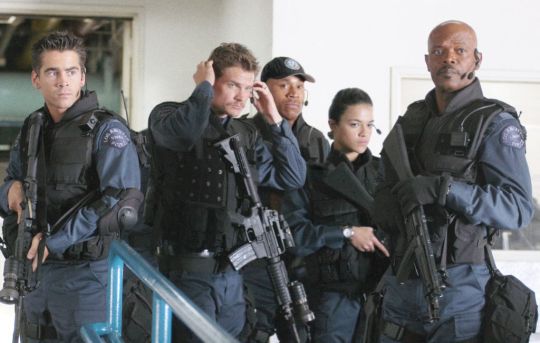
I wish it didn’t have to be like this. Generally speaking, there’s nothing wrong with Clark Johnson’s S.W.A.T. (2003); it’s a relatively diverting LAPD action thriller with a surprisingly solid, “in-their-prime,” cast.* Under different circumstances, producer Neal H. Moritz’s 2 Fast 2 Furious follow-up could be remembered for any number of things. It could be remembered for the cracker jack airplane paintball training sequence, or for LL Cool J’s preposterous abdominal muscles, or perhaps even for Gamble, Jeremy Renner’s emo ex-S.W.A.T. villain, who definitely looks like this:
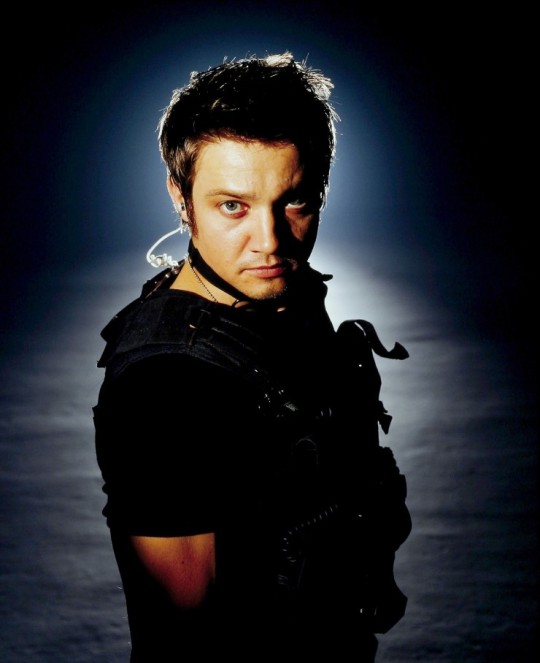
But that would be under different circumstances. As things are, all of the positive aspects of the fourth of five (!) Colin Farrell movies released in 2003 are overshadowed by the fact that this film contains the single most inexplicable logic hole / paradox in the history of movies.
At this point, you might be saying to yourself, “I don’t remember those parts of the movie that are supposedly ‘overshadowed’ by that other part of the movie that I don’t remember.” And you’d be right, because you don’t care about S.W.A.T., no one does.
But you’re about to.
Part One: The Theme Song
S.W.A.T was not the first time that a television show was adapted into a feature film. In fact, without doing any research, I’d venture to guess that S.W.A.T. isn’t even the second or third time this happened. And when a television show is adapted for the big screen, it is commonplace to include some kind of winking, self aware, moment that lets the audience know that the filmmakers are aware that the story they are telling is derived from a different story that was previously told on a different medium. Ben Stiller and Owen Wilson sharing a scene with the actors who played the original Starsky and Hutch in Starsky and Hutch (2004) comes to mind, or the “does she always look like she’s in slow-motion?” joke from the trailer for Baywatch (2017). There are many more examples, but since those are the only ones that immediately came to mind, they must be the best.
Considering that long, proud tradition, it isn’t unreasonable that the people behind S.W.A.T. wanted to throw in a reference or two to the ol’ TV show. In fact, the fans would expect no less! And the references begin subtly enough, with the famous theme song from the show, originally composed by Barry De Vorzon, woven into the fabric of the score of the film, composed by Elliot Goldenthal. This is great, a nice little nod to the TV show that instantly evokes jaunty 70’s police fun without being too on-the-nose or distracting. Plus, since the characters in movies cannot hear the score music, having the original theme song present there doesn’t create any irreparable tears in the foundational logic of the world of the movie.
So far, so good. But then…

Midway through the movie, after successfully passing the aforementioned airplane paintball trial and officially becoming a S.W.A.T. unit, our heroes go out for a celebratory BBQ dinner. They laugh, drink, ogle Ladies Love Cool James’ abs, listen to a somber speech by Sam Jackson about the unacceptability of dying, and then begin singing the theme song from S.W.A.T. the TV show. All of them. In unison.
At first blush this may not seem like an issue. After all, the S.W.A.T. theme song is simple and catchy. Real-life S.W.A.T. teams probably sing it all the time, like how pilots are constantly humming the Wings theme, and you can’t walk past a fire station without hearing some firefighter jamming out Third Watch on an electric keyboard. The issue comes with the realization that this particular S.W.A.T. team is in a movie directly based on the TV show that this song originates from, sharing their names and characteristics with the characters from said show. If the TV show existed in the world of the movie, and they all know it well enough to spontaneously break out singing the theme, surely by now one or more of them would have had the existential meltdown that comes with noticing that you and your friends have the exact same names as a fictional S.W.A.T. team from a thirty year old television show. Surely.
But maybe not.
While this seems like a fairly egregious oversight, it isn’t completely damning, and, with a little bit of “deleted scene hypothesizing,” can be explained away. Perhaps in the world of S.W.A.T., that catchy theme song did not originate with Mr. De Vorzon and the Aaron Spelling-produced show, which of course couldn’t exist, but rather with our heroes themselves, composed at some point in the course of the narrative and adopted as a personal pump-up jam. As far as I know, such a scene does not exist, but easily could, and would make an excellent addition to one of the films myriad training montages:
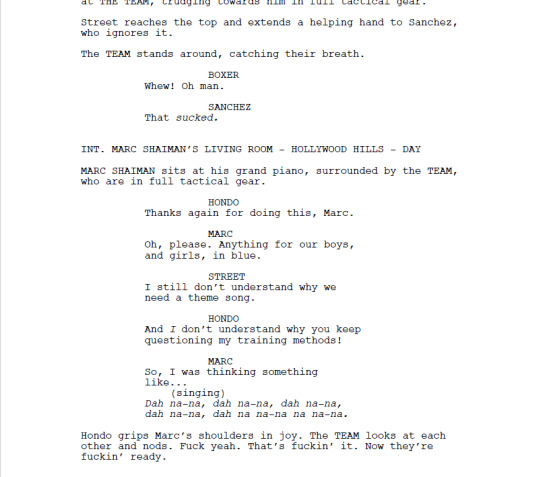
For this theory to hold water, one needs to assume that Oscar-nominated composer Marc Shaiman would be friends with Samuel L. Jackson’s Sgt. Dan “Hondo” Harrelson, but Shaiman seems very likable, so I buy it.
Whew, that was close. Clark Johnson, screenwriter David Ayer, and company, almost obliterated the reality of their film for a tossed-off joke, but with a little creative thinking on the part of the audience, the movie can continue on, unabated. All they need to do now is avoid making any more references to…
Part Two: The Actual Goddamn Show
… oh come on.
Mere minutes after the movie’s first flirtation with smashing through the fourth wall like the Kool-Aid Man, we find our heroes enjoying a much-deserved day off.
Sgt. Hondo and Lt. Velasquez (Reg E. Cathy) are putting in some time on the links…

… while Deacon takes his kids shopping…
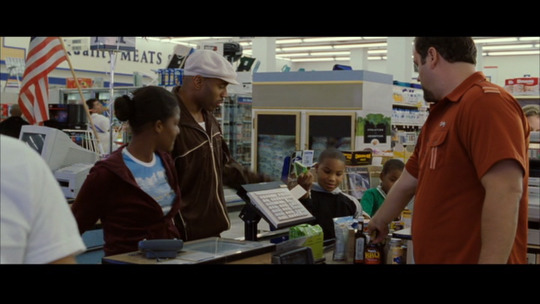
… TJ (Josh Charles) has a predictably douchey (lunch?) date at a French restaurant…

… Sanchez (Michelle Rodriguez) tests Street’s step-dad potential with a backyard water gun fight…

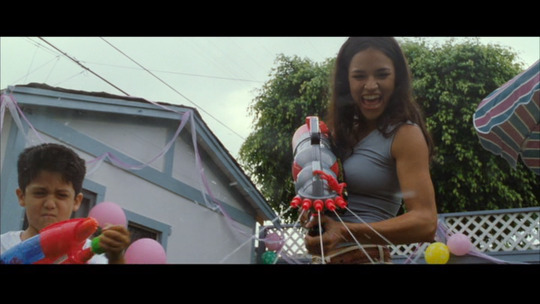
… and Boxer (Brian Van Holt) shirks his household chores…

… while kicking back on the couch with a lukewarm Dr. Pepper…

… and blithely watching everything he thought he knew about the universe be thrown into utter chaos.
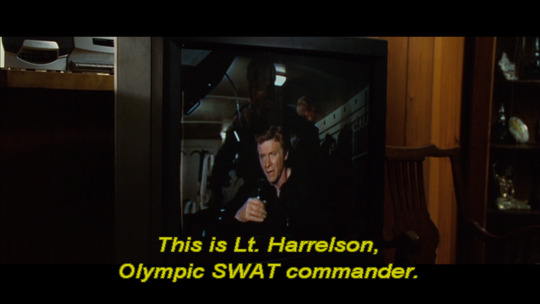

Well, shit. So much for the airtight “personal team theme song composed for them by Oscar-nominated composer Marc Shaiman” theory. This scene confirms it: the TV show S.W.A.T., a spin-off of The Rookies that aired from 1975–1976, exists in the world of the movie. The reason everyone was able to sing the theme song during that scene in the BBQ restaurant is because they are all aware (and presumably fans) of the TV show, S.W.A.T., which, again, exists.
How is it possible, in light of this new information, that every single last goddamn fucking scene in this movie doesn��t play out like so:
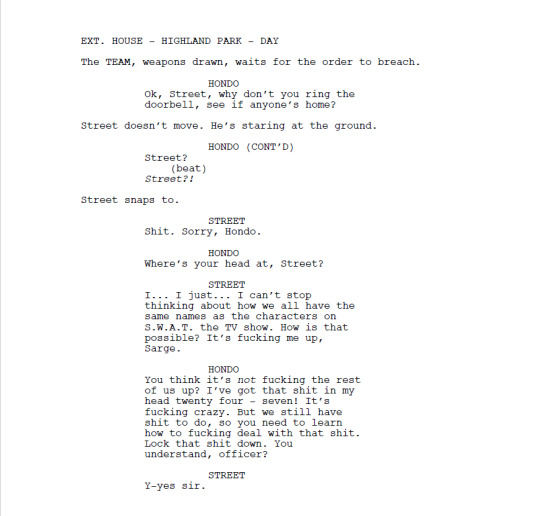
It just doesn’t make sense! All things considered, the movie S.W.A.T. should be about regular blue collar cops who, after bearing witness to a glitch in the space-time continuum, slowly lose their minds as they become feverishly obsessed with figuring out how this is possible and if they can fix this broken reality. Not one drug lord should be apprehended from a flaming private jet, not one beach dramatically ran upon by a dripping-wet Colin Farrell. Who has time for that kinda crap in the midst of their psyche slowly cracking into a million pieces? S.W.A.T. should essentially be the same movie as Jake Gyllenhaal’s Enemy, but with significantly more hair gel and leather cuffs; there’s no reason it doesn’t end with every character either dead, in an institution, or facing down a spider the size of a bus.
Part Three: Theories
Honestly, the time for excuses is over. The stretch that was necessary to explain away the theme song gaffe was just barely short enough that I was willing to make it. This, however, is a bridge too far. By including a clip from the actual show, S.W.A.T. earned itself the dubious honor of having The Biggest Logic Hole In The History Of Cinema, full-stop.
However, in blatant defiance of the sentence immediately preceding this one, I am not going to stop, but rather press forward, with a collection of theories that attempt to bring sense to the nonsensical, and fill The Biggest Logic Hole In The History Of Cinema.
Each theory will be followed by points both for, and against.
Theory 1: The characters in the movie all love S.W.A.T. so much that they legally changed their names to those of the characters on the show.
Ok, maybe? But since none of the characters know each other at the beginning of the film, that means they all did this very weird thing independent of each other, and just coincidentally all picked different characters. Then to top it off, they were all recruited for the job that the fictional character that they named themselves after also had, and in the same unit, no less. And then they never spoke about it.
Actually, no. For the one, the probability of that happening is infinitesimal, and for two we know from the movie that Hondo didn’t recruit people based on their names, he recruited them based on their willingness to beat the hell out of suspects, and enjoy “good old fashioned American hot dogs.” Plus, if it was some pro-level “The Secret” shit, they would go on about it non-fucking-stop and they’d be on, like, The Talk, if that’s still a show.
Theory 2: It’s the holodeck, from Star Trek
“Whoa, these theories sure went off the rails quick, didn’t they?” Why yes, they did. The theories went off the rails with a quickness that is in direct proportion to the insanity of the hole.
S.W.A.T. officer Michael Boxer (the grinning layabout we see watching S.W.A.T. on his couch) is actually Lt. Mike Boxer, a security officer on a Galaxy Class starship that isn’t the Enterprise, I don’t know their names, but one of the other ones. Since nothing ever fucking happens out in space (remember, not the Enterprise), Lt. Boxer stares wistfully out at the stars, lost in nostalgic reveres about the good ol’ days of cops and international drug kingpins, until he remembers that there is a holodeck and he can just go and do the damn thing. So, not unlike Capt. Picard and his 40s private eye fantasies, Lt. Boxer wiles away the hours in his program set in 2003 Los Angeles, because really, was there ever a better place and moment in American history?
I’m still thinkin’ no. If this is Boxer’s program, which is assumed because he’s the one who is unequivocally aware of the show, why is he not the lead? Hell, he isn’t even on the poster! Who writes themselves into something as a supporting character who gets shot and has to sit out the entire climax of the story? Unless this is some sort of reverse- Lt. Barclay situation, where in real life Boxer is the cock of the walk and his secret fantasy is to be background bullet fodder… I don’t know. I’ll chalk this one up as a “possible.”
(You: “Wait, the author snarkily implies that, like all cool people, he knows the bare-minimum necessary about Star Trek, but then invokes occasional guest character Lt. Barclay as a reference? Just how much does he actually know about Star Trek: The Next Generation? Is he secretly a big The Talk fan as well?” Me: “Fuck you, that’s how much.”)
Theory 3: Michael Boxer is a bored immortal and/or interdimensional being
This theory is similar to the holodeck theory, but with a less proprietary mythology. Basically, Boxer is an ancient, and possibly interdimensional, being who loved the television show S.W.A.T. so much that he decided his late-20th century game would be organically recreating the program, with real people and real situations. He Marty McFly-ed all of the heroes’ parents (“You know a name I’ve always liked? Hondo...”) then took up some sort of mentorship role during their youths (a teacher, coach, surprisingly wise vagrant, etc) to subtly nudge them in the direction of law enforcement. Boxer has had millennia of practice with human Rube Goldberg puzzles like this, so he’s really fucking good at it and it works like a charm.
“If he was an influential part of their young adulthoods, why doesn’t anyone recognize him as such?” Easy, the mustache. Next.
“Why does he allow himself to be shot at the end of the second act?” Because he needs to take himself out of the situation in order for his little baby birds to fly on their own. Next.
“What about the continued existence of the show? And knowledge of the theme song?” In his capacity as wise vagrant, he indoctrinated his pupils with the idea that television is evil and should be avoided at all costs. As for the song? Welcome back to the game, Clay’s Perfect Marc Shaiman Theory From Earlier!
Holy shit, you guys. I think we did it. We patched the biggest logic hole in the history of cinema. Congrats, Brian Van Holt! Here you’ve been for the last fifteen years thinking you played seventh banana in a moderately successful PG-13 franchise non-starter, when you were actually playing omniscient god-like banana in a moderately successful PG-13 franchise non-starter. I’m glad we were able to do you this service. You can now be at peace.
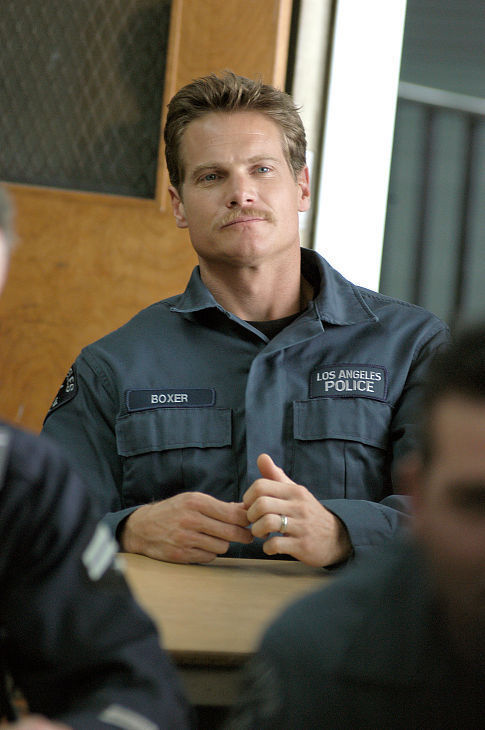
Part Four: What Come Next?
As you are no doubt already aware, the S.W.A.T. legacy is far from concluded. A new version of the series, from The Shield creator Shawn Ryan and Fast Five director Justin Lin, is premiering this fall on CBS. Oddly, it is an adaptation of both the TV show and the movie, since it incorporates the Chris Sanchez character that was originated by Michelle Rodriguez in the film.
This begs the question, will ageless interdimensional trickster god Michael Boxer also appear in the new series? According to imdb it would seem that he does not show up in the pilot, but that doesn’t mean much. Scripts can be rewritten. Pilots can be re-shot. Just imagine the narrative possibilities of adding a TV-obsessed, all-powerful, immortal character to a gritty LA police / social drama. I’m not saying that it will be better, because that is obvious, and I am not in the habit of redundantly pointing out the obvious.
Do with this information what you will, Shawn Ryan. I know you’ll make the correct choice.
In Conclusion:
youtube
*S.W.A.T. is actually a pretty damn good time. Underrated. Check it out.
#S.W.A.T.#jeremy renner#samuel l jackson#michelle rodriguez#josh charles#ll cool j#brian van holt#david ayer#movies#screenwriting#clark johnson#los angeles#aaron spelling#shawn ryan#colin farrell#clay keller
15 notes
·
View notes
Text
Bright Wall/Dark Room February 2019: A Love Story and a Tragedy - Second Lives and Lost Time in Doctor Zhivago
We are pleased to offer an excerpt from the latest edition of the online magazine, Bright Wall/Dark Room. Their latest issue celebrates the theme of "Time." In addition to Roxana Hadadi's piece below on "Doctor Zhivago," they have essays on "The Last Picture Show" and "Texasville," "La Jetee" and "Sans Soleil," the "Captain America" films, "Twin Peaks: The Return," "The Way We Were," "Springsteen on Broadway," "Mirai," "The Set-Up," and more. The above art is by Tony Stella.
You can read our previous excerpts from the magazine by clicking here. To subscribe to Bright Wall/Dark Room, or look at their most recent essays, click here.
Some movies have been in my life so long that I have no memory of when I first saw them, except to know that they’re my parents’ favorite movies, and by extension, some of my own: The Sound of Music, Giant, Vertigo, To Kill a Mockingbird, Lawrence of Arabia, The Bridge on the River Kwai. David Lean, the director of the latter two films, might be my parents’ favorite for the vastness of space he was able to capture in his lens, the intimacy of feeling, the way his characters often become trapped in situations of their own making.
Doctor Zhivago is the Lean film my parents return to most often, and the one that shatters me most thoroughly—a love story and a tragedy in equal measure, the elegantly lilting strings of a balalaika building upward and upward and upward until they are abruptly cut short. It makes me think of how my parents measure time: before the revolution, and after it.
*
Not the Russian Revolution, although that is the focus of Lean’s Doctor Zhivago, adapted from the novel by Boris Pasternak, but the Iranian Revolution—1978 through 1979. My parents weren’t living in Iran then; they had already gingerly stepped forward into their second lives in America. There had been a prospect of maybe going back to their homeland, to a place that they say feels different, looks different, is different from the United States; but that was no longer possible. There are places you can’t go back to, and questions you can’t ask, and people you can’t be anymore. Doctor Zhivago is about all of that, and watching the movie as many times as I have is mostly about trying to understand my parents’ lives, failing, and desperately trying over and over again. It’s about losing something, and unceasingly searching for it, and wondering if love is ever enough.
“Feelings, insights, affections—it’s suddenly trivial now,” says the Bolshevik commander Strelnikov (Tom Courtenay), a man who used a revolution and a war to reinvent himself, to the poet Dr. Yuri Zhivago (Omar Sharif, gorgeous), whose writings are publicly outlawed by the Soviet regime and secretly admired by the Russian people. But that interiority is all Yuri has in a society that is controlled, watched, and surveilled. It’s all my parents had, too.
*
To be a first-generation American is to grow up realizing there are questions your immigrant parents absolutely won’t answer, parts of themselves they will never share. I know the bare sketches of my parents’ lives before they came to the United States, but I also know—intrinsically, maybe—what not to push. Maybe it’s a cliché to say an elementary school family tree assignment was an unexpected difficulty, but it was.
There were grandparents I didn’t know who had died, and aunts and uncles and cousins I would never know because they lived in Iran and couldn’t come visit us, and we couldn’t go visit them. A veil hanging over all of it, like the chadors and hijabs the Islamic government began to force all women to wear outside of the home after the Revolution. Iran’s women are fierce—they serve in the Iranian Parliament, have been awarded the Nobel Peace Prize and the Fields Medal, practice jiu-jitsu in secret and win Olympic medals for taekwondo—but this mandatory covering is only one of many means of government control, of the diminishing of personal choice.
Everything I wanted to know about what my parents had gone through, what informed their decisions, what shaped their lives, was like picking at the edges of a scab, a wound not fully healed. The time to ask those questions never seemed right. Nothing about the Iranian Revolution seemed to work out like people wanted—not for people like my parents, or people like their friends, or people like the professors I had while studying Persian literature and film in college. They wanted freedom from monarchy and ended up with restriction through religion.
This is a culture that prized art and poetry and beauty (and wine!) for centuries, but not much of that was respected in the same way anymore. Not after the power grabs of the Iranian Revolution went the hardliners’ way, and not after the Islamic government consolidated authority throughout the Iran-Iraq War of the 1980s, and not after increasingly fraught relationships with the rest of the world in the 1990s and 2000s. All this despite cries from inside the country, despite bloodshed in the streets.
Intellectuals disappeared, dissenters disappeared, writers and musicians and artists disappeared. My parents whispered their names. They hung their portraits on our library wall. And I rarely, possibly never, asked about them. Maybe I thought I couldn’t, or maybe I thought I shouldn’t. “Why dig deeper into my parents’ pain?” I rationalized then. “Why didn’t I care enough to ask?” I think now.
*
“We admire your brother very much,” says a dam worker to Lt. Gen. Yevgraf Zhivago (Alec Guinness) at the beginning of Doctor Zhivago, in the 1950s, when Yevgraf is searching for a woman he suspects is his half-brother’s lost daughter. “Everybody seems to—now,” Yevgraf says back in Guinness’s crisp, perfectly commanding voice, but not even he has a response to the man’s follow-up: “We couldn’t admire him when we weren’t allowed to read him.”
What you’re allowed to do and not allowed to do comes up often in Doctor Zhivago. Where you’re allowed to work, what you’re allowed to read, who you’re allowed to love. The story begins before World War I, in two different spheres of Russian life. First is the upper-class world of Yuri, a young man who was adopted as a child by a well-to-do old-money family and has since excelled at nearly everything he tries: graduating in the top three of his class from medical school, attracting national and international acclaim for his deeply felt poetry. And then there’s Lara (Julie Christie, resplendent): 17 years old, working class, determined to win a scholarship to university, the daughter of a seamstress catering to wealthy clients, preyed upon by the well-connected government official and despicably manipulative villain, Victor Komarovsky (Rod Steiger), who used to be a friend of her dead father’s.
Yuri has the empathy of an artist and the compassion of a healer. He sees his patients and is moved by their humanity, and when he meets Lara, he admires her resolve. It takes a certain kind of steadfastness to refuse a man like Komarovsky, whose obsession with Lara resulted first in an affair and then in sexual abuse, and that is what drives Lara for years afterward. When Yuri meets her again four years later, it’s on the Ukrainian Front during World War I, where he’s working as a field doctor and she has volunteered as a nurse. They’re each married—Yuri to Tonya (Geraldine Chaplin), the daughter of the family he grew up with, and Lara to former labor organizer and political dissident Pasha Antipov (Courtenay), before he transforms himself into the merciless Strelnikov—but their love for each other is an undeniable thing.
When the dam worker learns who Yevgraf is in the beginning of Doctor Zhivago, he speaks of the titular man and “the Lara” with an air of wonder and reverence. Yuri’s most famous poems were about her, but also the uncertainty of living in a country in transition, with a past that now seemed unfathomably distant. “Wouldn’t it have been lovely if we met before?” Lara wonders, and the question nearly drives Yuri to insanity (“I think we may go mad if we think about all that”) not only because of the possibilities it holds but because of the reality that it never was. “I shall always think about it,” Lara replies, but her hope for the future is hollow. There can be no redemption of the past.
Lean understands the hazy nature of time, framing Yuri and Lara together in shots with fuzzy edges, like a treasured memory slowly slipping away. Most importantly, he lets Christie and Sharif explore the rhythms of their characters as they fall in love. As Yuri, Sharif’s eyes glitter with tears nearly every time he looks at Lara. That rawness is reminiscent of the emotion that washes over his face during his first conversation with Komarovsky, when the man admitted to knowing Yuri’s father and complimented the way “he was devoted to your mother.” Yuri guards the memories of his parents with the same fierceness it took Lara to stand up to her abuser, and he understands what the passion he feels for Lara means.
And as Lara, Christie has the unwavering glare of a woman who knows she has been wronged, who has been conditioned to believe that men never stay, who remembers how her mother almost killed herself when she learned of her daughter’s sexual relationship with Komarovsky. She refuses Yuri’s romantic overtures at first, but who doesn’t desire to love and to be loved? When they meet again, she is stunned into silence, and then overjoyed. “Your letters were full of her,” Tonya had said to Yuri when he returned from the front, noting how often Lara came up in his correspondence home. His heart was full of her, too, and all of them knew it. Yuri, Lara, Tonya, trapped in a maze of love and loss of their own making, stepping toward and backing away from each other over years of time, as the country around them roiled and rebelled.
*
“Adapt yourself,” a volunteer for the Red Guard tells Yuri after his service at the front has ended. When he returns to Moscow, he learns his house has been partitioned into living space for 13 families. Soviet officials are watching his every move, concerned that his popular poetry is anti-Communist. Time has mutated Yuri’s home into a place where everything is forbidden—honesty, sincerity, kindness—and his family must eventually flee. “Your attitude is noticed,” one of those party members says to Yuri before Yevgraf steps in to warn his half-brother that Moscow is no longer safe for him. But when your country is unrecognizable to you, where can you go?
My parents returned to Iran to marry—my father in a creamy ivory suit and crisp leather shoes, my mother in a satin dress with knife pleats and a lace veil—but came back to the United States to live. They said their vows and made their promises in a place they loved, and then they left. What kind of bravery does it take to start over? What depths of fortitude? The kind that Yuri and Tonya drew on to relocate their family to the Russian countryside, to starting new lives in the desolate Varykino, where each winter encases their cottage in depths of ice? Or the kind that inspires Yuri to leave the Red Army after being captured and forced to be their medical officer for two years? The decision almost seems lackadaisical, just a man on a horse, watching other men walk away from him in a misty, snowy field, turning backward instead of forward. But the simplicity of that motion—one path taken, another refused—is the end of one life and the beginning of another.
Yuri’s choice is one in a series of many that demonstrate his love for Tonya, his love for Lara, and his love for his country—and yet each source of affection is, with time, also a source of suffering. He learns that Tonya and their children fled Russia while he was held by the Red Army, and is haunted by visions of them trudging through snow, leaving him behind. He discovers that Lara is in the nearby village Yuryatin, and although they renew their love for each other, they’re found by Komarovsky, whose obsession with Lara has continued unabated. “Who are you to refuse me anything?” Komarovsky snarls. But he divulges that the couple is in danger and helps Lara escape, providing transport for her—pregnant with Yuri’s daughter—to Mongolia, where they can live in secrecy.
But Yuri? “He’ll never leave Russia,” Lara says, and she’s right. Years after they part, Yuri dies of a heart attack, thinking he spotted Lara walking by on a sidewalk, unable to gain her attention from the inside of a passing-by train. It’s a moment of profound, devastating loneliness in a film that specializes in them. Yuri is a boy when we first see him at his mother’s funeral, imagining what her body looks like inside its wooden casket. That night, he peers out of an icy window, listening to frozen branches tapping against the glass, his only possession the colorful balalaika that was his inheritance from his mother—and that he never had the talent to play, but years later, his daughter with Lara does. As an adult, he’s a half-frozen man in tattered clothes, a vacant, haunted look in his eyes as he flees the Red Army as a deserter. And in his last moments of happiness with Lara, he’s a romantic who refuses Komarovsky’s offer of help because he can’t abide being assisted by a man like that.
Lean excels at pinpointing how Yuri is a man out of place, struggling to understand a country around him that is changing all the time. Alone when watching a workers’ march and the ensuing military slaughter of the protestors from the balcony of his family’s palatial home. Alone when following the fragmented rays of sunlight piercing through the trees of a quiet, foggy forest. Alone when facing off against a pack of howling wolves. And alone when wandering through a reclaimed estate turned into a makeshift hospital, the only other living thing inside the home a vase of sunflowers, their petals slowly falling.
In death, Yuri is all of those selves: the boy abandoned, the citizen disillusioned, the man overcome by love. When he collapses in the street, he is overwhelmed by other bodies running to his aid, while the one he wants to see so badly—the woman who could be Lara—keeps on walking, oblivious to his pain. I cry so frantically every time I watch Yuri die that sometimes I feel like I’ve stopped breathing: mourning the life of a man emblematic of an idealism long gone, and mourning the lives my parents could have had.
*
“Don’t you want to believe it?” Yevgraf asks Tanya (Rita Tushingham), a young woman he thinks is Lara’s and Yuri’s missing daughter, after he tells her the story of his half-brother and the woman he loved. “Not if it isn’t true,” she replies, and there’s such yearning to that statement: the desire to truly know something, to examine the ridges and contours of it, to feel how it fits into a part of your heart that previously was unfilled.
Doctor Zhivago doesn’t have a happy ending. Aside from Yuri’s death, there’s Lara’s disappearance (“She died or vanished somewhere in one of the labor camps, a nameless number on a list that was afterward mislaid. That was quite common in those days,” Yevgraf says), and the realization that maybe Tanya won’t ever accept the truth of her parentage. And there’s the truth, of course, that millions of other people died during that time in Russia’s history, that countless families were pulled apart, that so many people were sent away and never came back. Not that different from the Iranian Revolution and what happened afterward. Not really.
“He kept a lot to himself,” Yevgraf says of Yuri, and I think of my parents. Of the lives they had before they met each other and before they married and before they realized the Iran they were born into was no longer theirs. Of all the things they keep hidden away, even now, even after they’ve lived the majority of their lives outside of a country they still call home. Of all the family they can’t embrace again. Of all the time they can’t get back.
I realize in my adulthood that maybe this is why my parents hold Doctor Zhivago so close to their hearts. Maybe they see Yuri and Lara in themselves: people who were denied a country and a way of life. “People will be different after the revolution,” the man who was once Pasha Antipov tells Lara. “It takes a while to get used to things, doesn’t it?” Yuri’s adoptive father says to him. Both were right and both were wrong, and that duality—the inescapably forward movement of time, and how people and places and identities are lost to the past, destroyed and mourned—is the aching tragedy of Doctor Zhivago.
from All Content http://bit.ly/2SsEZC5
0 notes